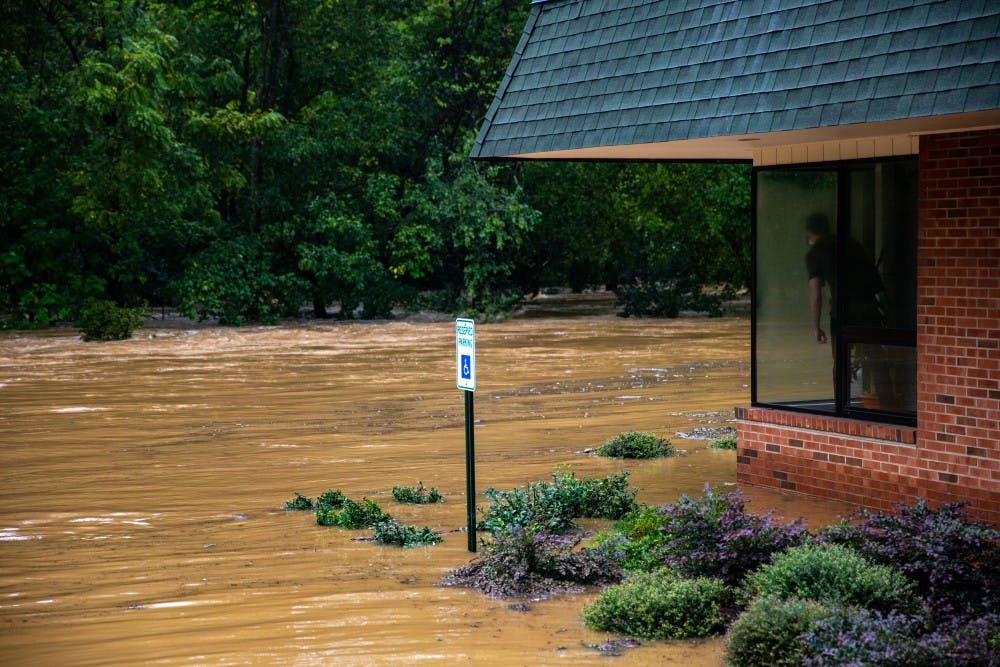He said the county’s Emergency Services department plans to coordinate with hotels in the community who could house people during a storm in a more socially distanced manner by keeping groups separated by family into different rooms within the hotel.
Saunders said the spaces used as shelters would also need enough rooms to separate those who may have been exposed to coronavirus or are symptomatic — whether that means separating them by floors or keeping people who are sick or may have been exposed in different facilities.
Along with that comes the challenge of finding hotels that will agree to shelter people who may be symptomatic or have been exposed to COVID-19, he said.
Regardless of what kind of shelter they use, Saunders said officials will have a screening process in order to determine those who may have been exposed to the virus, are self-reporting or are exhibiting symptoms of COVID-19.
“In a situation like a shelter, it’s a very delicate balance. First and foremost, we need to provide people safe shelter,” Saunders said. “And so, that’s the first priority, is to give them safe shelter. Second to that, we’ve got to make sure that we do it safely.”
Saunders said that Orange County normally prepares to house around 1,200 people in storm shelters.
Even if they find enough hotels to house the expected number of Orange County residents needing shelter, Saunders said another challenge is that many people who evacuate from the east coast of North Carolina tend to end up in the central part of the state, and would also need to be housed during a storm.
He said that Orange County Emergency Services has a lot of work that still needs to be done to prepare for hurricanes this year, alongside the pandemic.
Vicki LaBelle, the executive director of the American Red Cross of Central North Carolina, said that non-congregate sheltering, like hotels, may be ideal during the pandemic, but not necessarily possible for large evacuations like what happened during 2018's Hurricane Florence, depending on the area and what resources are available.
During Florence, the UNC Friday Center was used as a shelter to house those who had evacuated from coastal communities.
“If we’re talking about thousands of people versus dozens of people, the likelihood would be higher that we’re having to do some congregate sheltering,” LaBelle said.
If the Red Cross were to have congregate shelters, LaBelle said, their goal would be to lower the capacity of each shelter in order to have more space per person, in addition to having personal protective equipment readily available.
To get the day's news and headlines in your inbox each morning, sign up for our email newsletters.
How to prepare
Sarah Pickhardt, Orange County's emergency management planner, emphasized how important individual preparation is for hurricane season.
She said now is the time to take three important steps: get an emergency kit together, make a plan and stay informed. Because of the pandemic, you should update emergency kits to include things like cloth face masks, Pickhardt said.
LaBelle said that individual preparation is important for hurricanes, but also all potential emergencies.
“You know, it’s always a good time for people to evaluate, not only for hurricane season, but what other disasters they might be at risk for,” LaBelle said “And, that could include a home fire, it could include wildfires, tornadoes, floods, severe storms.”
In a press release last month, Gov. Cooper declared May 3-9 as Hurricane Preparedness Week, urged North Carolinians to update their emergency plans and introduced Know Your Zone, a tiered evacuation system and tool that allows people in North Carolina to see what evacuation zone they are in based on a street address.
During Gov. Cooper’s May 8 coronavirus press briefing, Mike Sprayberry, the North Carolina emergency management director, said it is important to pay attention to emergency alerts about evacuations or warnings on your phone, which you can turn on in settings on your smartphone. Sprayberry said concerned residents can also receive alerts from different weather apps.
No matter what, Pickhardt said, it's good to have a plan.
“If we do have a hurricane threat, the extreme preference is that they have a plan ready to go — where they know if they need to evacuate, where they can evacuate to, how they’re going to keep in touch with friends and family and let them know that they’re OK,” she said.
Hurricane preparedness resources:
- Sign up for OC Alerts for updated emergency information here in Orange County.
- For more information on hurricane and emergency preparedness in North Carolina, visit readync.org.
- For hurricane tracking information from the National Weather Service, emergency safety tips and shelter and disaster recovery center locations, download the FEMA app.
- Visit redcross.org for information on preparing emergency kits, sheltering and other emergency preparedness information. The Red Cross is still offering First Aid and CPR courses.
- During natural disasters and other emergency situations, blood supplies suffer because of the effects on the Red Cross’ ability to hold blood drives, LaBelle said. To donate blood or find information on local blood drives, visit redcrossblood.org.
- For COVID-19 health and safety guidelines, visit the NC Department of Health and Human Services coronavirus guidance website.
@mereditharadfor
@DTHCityState | city@dailytarheel.com



